|
 |
|
 |
OUR COMMITMENT: GETTING CERTIFIED BY THE RAINFOREST ALLIANCE
|
 |
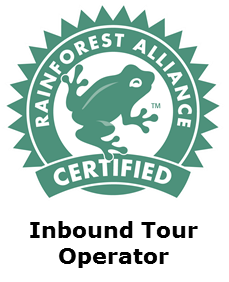 |
|
Since
December 2018, all of our SAT offices are
certified by the Rainforest Alliance (RA) for meeting the requirements of the
Sustainable Tourism Standard for Inbound Tour Operator! The RA is an international nonprofit environmental organization, that aims to
protect the environment and
improve the worldwide living conditions. In order to achieve that, the RA consults, supports and certifies businesses.
Each of our offices had to accomplish an
individual certification process and comply with the Rainforest Alliance Sustainable Tourism standard indicators. These indicators are a variety of measures that need to be implemented to
ensure i.a. environmental protection, social and cultural development in the destination, respectfulness of the locals and a sustainably managed business environment. Since these qualities are important to us and we want to communicate them transparently, we are proud that the RA acknowledges our efforts in
contributing to a change towards sustainable and fair tourism!
|
 |
|
 |
LOCAL PROJECTS - MAKING A DIFFERENCE
|
 |
We would like to give you a brief insight into the
local projects we promote in our destinations. In
Argentina we support
APROPDIS, an association for the promotion of people with a disability, that enables disabled people to work and earn money on their own. At the moment it has capacities for eight members who produce and sell alpargatas, typical gaucho shoes. In
Ecuador we are engaged in the
Fundación Aliñambi that provides a home and education for 36 children who used to live on the streets. The facilities of the Fundación Aliñambi also include a bakery, a carpentry shop, a greenhouse and a school that is also visited by other children who live nearby. In addition to that, to
reduce our carbon footprint and to help protecting the
Peruvian mountain forest, we support the
Cordillera Azul Nationalpark Project by Ecosphere+. While the National Park covers approximately 13,500 km², the project itself works in a larger area of almost the size of the Netherlands. With Ecosphere+ you may also
calculate and
compensate your own carbon footprint. Since we donate
2 US$ of every booked tour to our local projects, each of our guests has a part in supporting them as well. Would you like to know more about or
visit our local projects? Then feel free to contact us or to
visit our website! Photo credit: Ecosphere+ / Nancy Stone
|
|
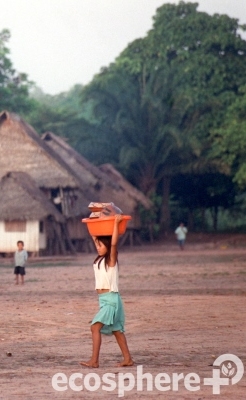 |
 |
|
 |
Additionally, last year we became a member of
The Code of Conduct for the Protection of Children from Sexual Exploitation in Travel and Tourism to create awareness and educate our staff to recognize critical situations and ensure the well-being of children. In August 2018, we also joined the
WTTC’s Declaration on Illegal Wildlife Trade. This was an important step to not only actively support the
fight against illegal trade in wildlife worldwide but also to find solutions on how the travel & tourism industry can help
eradicate Illegal Wildlife Trade. Visit the official websites of
The Code and the
WTTC to learn more about these important initiatives and how you can support them. |
|
SAT SUSTAINABLE - NEW TRAVEL SEGMENT
|
 |
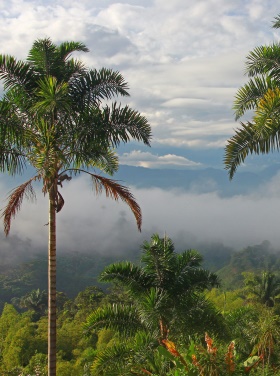 |
|
We are excited to officially present our new travel segment:
SAT Sustainable, where we attempt to
minimize the negative and maximize the positive impacts of tourism. All of the programs offer
authentic and nature based encounters with the countries and their inhabitants which is why we dubbed them the
"pure-line". The itineraries last between
13 and 21 days and each of them is a unique journey, with
numerous exciting natural and cultural experiences, reflecting the spirit of each country. You will find yourself hiking up to the
Tijuca Peak and Vale Encantado in Rio de Janeiro's Tijuca National Park, living the
Mapuche culture in Chile's lake region, planting a palm tree in
Colombia's coffee triangle, cooking Andean dishes with a
kichwa family in Otavalo (Ecuador), marvelling at the biodiversity of the
Ballestas Islands at the Peruvian coast, learning about the
artisanal women fisheries of Rocha Lagoon in Uruguay or strolling through the largest estancia of the Jesuits in Córdoba,
Estancia Santa Catalina. Curious for more? Then go ahead and
request our SAT Sustainable line now! |
 |
|
 |
|
THE FIRST STEP TO REDUCING PLASTIC WASTE IN SOUTH AMERICA
|
 |
|
The governments of several South American countries have taken an important measure against plastic waste and either banned single-use plastic bags or implemented regulations for a more responsible usage.
Chile was the first South American country to
adopt a nationwide ban of plastic bags in May 2018 and starting February 3rd, all shops in Chile will stop handing out plastic bags. In August 2018,
Uruguay joined in with a law to charge plastic bags in shops and prohibit the production, import, distribution or sale of non-biodegradable bags. And in December 2018,
Peru approved the "Plastic Law", that will
gradually prohibit single-use plastic products like bags, straws and polystyrene containers for drinks and food within the next three years. The use of said plastics is
already prohibited in 76 protected natural areas in the country,
including Machu Picchu.
But the attempts to regulate the excessive use of plastic bags go back even further. In 2017,
Colombia established a tax and changed the design of the bags to increase their reuse. Starting 2019, they implemented
bags of 3 different colours that come with an instruction to
boost waste separation and recycling: green for organic waste, grey for paper products and blue for plastic, bottles, metals etc. In
Buenos Aires all supermarkets are prohibited to use or sell plastic bags since 2017 and
São Paulo
prohibited the free distribution of plastic bags in 2015. We look forward to more positive developments and further steps by our governments towards protecting our planet!
|
 |
|
 |
|
THE SECOND LARGEST NATIONAL PARK OF THE COUNTRY - CHILE
|
 |
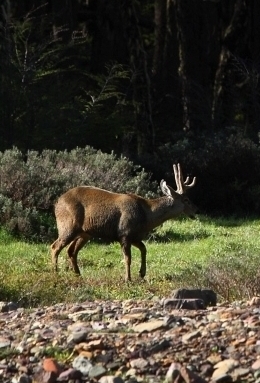 |
|
Chile is taking natural conservation seriously. A few months ago, we told you about the launch of the stunning
Ruta de los Parques de la Patagonia, and now, on Januray 21st, the
Tompkins Conservation and the Chilean government oficially added another
spectacular national park in the
Magallanes region: The
Kawésqar National Park, which is, after the Bernardo O’Higgins National Park, the
second largest of the country. It spans a terrestrial area of about
2,8 millon hectares, including the former Alacalufes Forest Reserve, and protects about
2,6 million hectares of surrounding marine territory categorized as National Reserve. Within this breathtaking environment you will find diverse landscapes, including
mountain ranges, forests, glaciers, fjords, lakes and wetlands, that are home to a to a
great variety of species. While exploring this natural treasure, passing by
Magellan's coihues and
canelos, you might be lucky enough to spot a
majestic puma, a
graceful huemul or an
agile culpeo fox. The unspoiled nature of the Kawésqar National Park and the Patagonian Route of Parks really is a must see so contact us for additional information and itinerary suggestions!
Photo credit: Turismo Chile / Juan Jaeger |
 |
|
 |
|
CHILE'S COMBAT AGAINST POLLUTION
|
|
For many people vacation includes relaxation on clean beaches or walks through untouched nature. The reality, however, is sometimes different and tainted by trash left by careless visitors like soda cans in the water, cigarette butts in the park and plastic bags in the forest.
To combat this type of pollution the Chilean government adopted a new law that prohibits soiling or leaving trash of any kind on beaches, riverbanks or lakes as well as national parks, reserves and monuments, etc. Infringements of this law will be punished with fines up to about 300 US$. Many countries would benefit from such a law, don't you think?
|
ECUADOR - PROTECTION OF A PRISTINE ENVIRONMENT
|
 |
|
The famous
Galapagos Archipelago is a
National Park and a
UNESCO World Heritage. It is the
habitat of numerous endemic and unique species, but many of them are endangered due to the turbulent history of the islands. Over the decades, strict conservation policies and regulations were developed to
protect the archipelago and its marvelous biodiversity. Plastic waste has been a huge problem on the islands and was highly threatening to the wildlife. Because of this, the government
banned four types of single-use plastics: drinking straws, covers, polystyrene products and bottles. The ban was implemented step by step and since the
21st of August 2018 the use of each of them is prohibited. After conservationists reported that noisy pyrotechnics provoked stress and anxiety in the animals of the archipelago (pet owners from all over the world can probably attest to that), the
sale and usage of loud fireworks was prohibited on Galapagos, allowing only those with soundless lighting effects. Both of the inured bans are necessary regulations and of particular importance for the well-being of the local wildlife and the protection of this rare biosphere and we are proud that Galapagos has taken these steps!
|
|
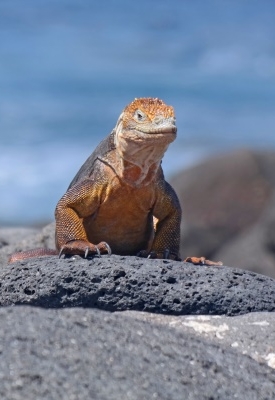 |
 |
|
 |
|
THE POPULARITY OF ECOTOURISM - BRAZIL
|
 |
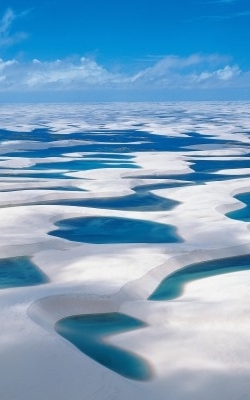 |
|
Ecotourism is
gaining popularity in Brazil, which was also reflected in the visitor numbers of the national parks. There are
69 national parks all over the country, 33 of which are open to the public. Last year, the
Parque Nacional dos Lençóis Maranhenses at the northern coast of Brazil had an incredible visitor increase of 46% until December! No surprise, as it is full of white shifting dunes and blue lagoons with varying water levels, which makes every visit unique. Also the famous
Iguazú Falls counted around 18.000 more visitors until December than in 2017. The impressive waterfalls
at the Brazilian-Argentinean border are a
UNESCO World Heritage and the surrounding national parks are home to a great biodiversity. Another famous park that welcomed an increased number of visitors was the
Chapada dos Veadeiros, located in the state of Goiás. It also is a
UNESCO World Heritage with rich vegetation and roaring waterfalls. Since every park provides unforgettable experiences, it is no wonder that the interest in them is growing steadily. Even with the election of a new government that appears to put less importance on environmental issues and sustainable advancement, we hope that the positive development continues.
Photo credit: Embratur / Rachid Waqued Neto
|
 |
|
 |
|
SABORES DA ROÇA JEEP TOUR
|
If you want to get a taste of
organic farming near
Rio de Janeiro, we highly recommend you join the
Sabores Da Roça Jeep Tour! On this full day journey you will get to know the
mountain region of Brejal where the first organic farming in Rio started in the 70s. Enjoy
beautiful and diverse landscapes, visit
small family-operated farms to learn about the wide range of fruits, vegetables and herbs they produce, attend a delicacy tasting at an escargot farm and visit a famous
equestrian stable. For lunch you will stop at a garden farm, where you will
relish local foods and international flavors, before the adventure continues. For more information about this tour, feel free to
contact us! |
URUGUAY - GREEN DEVELOPMENT
|
 |
|
Despite being the
smallest country in South America, Uruguay is the one with the
greatest prospects of green development. It is
rich in natural assets and over 50% of the the country's exports are related to
farming. These resources are also one of the main
tourism attractions. In order to ensure their endurance on a longterm basis and to find a
balance between financial value, social development and environmental conservation, a sustainablitiy strategy was needed. Since the introduction of its
Soil and Water Conservation Law in 1982, Uruguay is one of the most advanced countries with regards to soil management. Furthermore, it developed action plans for the
protection of environmental and drinking water sources and started on the
reduction of emissions of the beef production. One of the country's milestones in terms of green development was the creation of the
National Environmental System, with the National Secretariat of Environment, Water and Climate Change in 2015. But there is still a lot to do, especially in terms of tourism. We for once will be looking forward to the promotion of nature, adventure and eco-tourism activities to establish Uruguay as a
sustainable tourism destination and will do our best to support this goal!
|
|
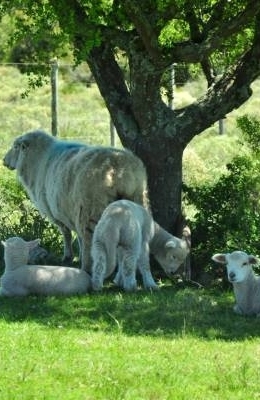 |
 |
|
 |
|
CONJURING SMILES IN QUELQANQA - PERU
|
 |
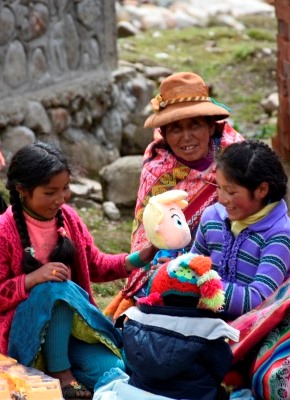 |
|
Our team in Peru ended the last and started the new year supporting their local communities. In
December, they joined forces with the medical center
Clinica SOS in Cusco, local tourism guides and transportation companies to visit the
Andean community Quelqanqa, located 2h from Ollantaytambo in the Sacred Valley. The guides and our team donated
blankets, clothes, toys, stuffed animals and school supplies to the community as well as
a bike, a tricycle and food to the local school. We also brought along a
clown who put up a show for the kids while we served
hot chocolate and snacks. The transportation companies offered vehicles to take everything and everyone to Quelqanqa. We were accompanied by an ambulance and medic from the Clinica SOS who gave
free examinations and handed out vitamin supplements. We will also continue to
support the community's reforestation project in the future.
In January, we joined the organization Ecostyle for an ecological walk that was dubbed "SAT for the Environment". The walk's objective was to collect 50kg of trash in the outskirts of Cusco together with our friends from Ecostyle.
|
 |
|
 |

|
 |
|
 |
 |
The
EcoCamp Patagonia, located at the foot of the
Torres del Paine, won the
2018 Adventure in Motion award with its short documentary
"Adventure is for All", showing that a wheelchair does not hinder you from enjoying adventurous hikes. The locally owned, charming
geodesic dome hotel not only helps to make the W-Track accessible for everyone, it has also been
commited to sustainability since its beginnings in 1999. It is
ISO14001 certified, uses solely renewable energies, has a thoughtful waste management and supports the local communities by purchasing products and employing mainly locals. |
|
|
|
The Finch Bay Galapagos Hotel was acknowledged as South America's Leading Green Hotel by the World Travel Awards in 2018. In addition to that, around midyear, the overall sustainable hotel near Puerto Ayora introduced a new transferboat: a completely solar-powered Solar Ray, equipped with four solar panels situated on its rooftop. This way the guests can enjoy silent and emission-free transfers between Finch Bay (Punta Estrada) and Puerto Ayora.
|
 |
|
 |
 |
|
The Portuguese airline Hi Fly launched the world's first "plastic free" flight from Lisbon to Natal in Brazil on December 26th. Single-use plastics such as cups, dishes and packaging, were replaced by bamboo cutlery, paper packaging and compostable containers. By the end of 2019, the airline plans to ban single-use plastics from its entire fleet.
In 2017 Iberia started with "Zero Cabin Waste", a project that aims to reduce waste by 5% and recycle 80% of the waste generated in the cabins. To achieve this the airline provided various trainings to the cabin crew, introduced a new two-compartment waste trolley and ran various tests on flights in 2018. On October 9th, they were ready to implement the selective waste collection on national and European flights.
|
|
|
|
For the fifth year in a row, LATAM was recognized by the Dow Jones Sustainability Index for its sustainability practices. One of its sustainable goals is to achieve carbon neutral ground operation. Since 2012 it reduced the emissions of its ground operations by 36% and since November 2018 LATAM Airlines Chile uses 100% renewable energy in its Santiago operations.
Avianca was recognized by the Dow Jones Sustainability Index for the second consecutive year. Avianca's commitment to sustainability includes for example its membership of the Carbon Disclosure Project (CDP) in order to invest in carbon neutrality strategies and compensate emissions.
|
 |
|
 |
South American Tours - Global Sales Office
South American Tours GmbH | Kaiserstr. 23 | 60311 Frankfurt am Main | Germany
Phone: +49 (0) 69 4058970 | Fax: +49 (0) 69 40589799
Mail: sales@southamericantours.com | www.southamericantours.com
South American Tours - Sales Office North America
Phone: 1844 7288460 (toll free from the US)
Mail: sales-america@southamericantours.com
Copyright © South American Tours 2012-2018
Imprint
South American Tours de Uruguay Agencia de Viajes S.A. | Buenos Aires 618, Piso 2, Oficina 201 | 11000 Montevideo | Uruguay
Tel.: +59 82 91 60 050 | Fax.: +59 82 91 55 406 | E-mail: info@southamericantours.com
Managing Director: Federico Büker | Registered Office: Montevideo | Local Court: Montevideo | Commercial Register: 1194 (Ministry of Tourism) | VAT identification no.: 215224020014

|
 |
|
Protection of data privacy and cancellation of the subscription:
This message has been sent to 10063. If you do not want to receive mails in the future you can unsubscribe by clicking
here.
|
|
|
 |
|
 |
 |
|
|